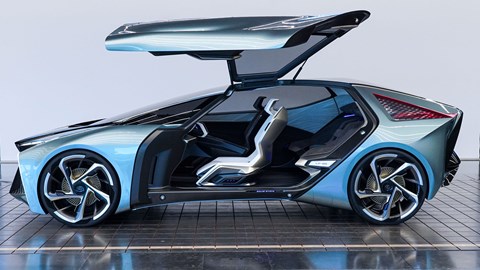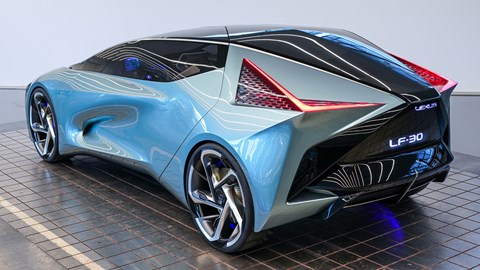► Lexus’s new definition of electric luxury
► Funky four-seat crossover with gullwing doors
► Lexus also confirms a BEV production car on sale next year
Lexus is finally making moves towards the battery-electric bandwagon, unveiling the LF-30 Concept at the Tokyo motor show. A four-seat crossover fusing the marque’s key values of performance and luxury, the LF-30 is a rolling showcase of the technology and thinking Lexus feels will elevate battery-electric vehicles to new levels of driver appeal, convenience and near-silent refinement.
One motor per wheel
The LF-30 uses four independent e-motors, one per wheel, promising outstanding agility. ‘The LF-30 offers a new level of driving pleasure, with a drive system that offers outstanding control, comfort and confidence,’ says Lexus’s Takashi Watanabe. ‘The LF-30 also uses a full steer-by-wire system with more flexible turning control and steering feel more precisely aligned with the driver’s intent,’ adds Watanabe, suggesting Lexus isn’t about to ditch its performance credentials with its move to a pure EV.
A-Z of the new cars at the Tokyo motor show
This motor-per-wheel arrangement flies in the face of the established battery-electric norm: both the Porsche Taycan and Tesla Model S feature twin motors, one per axle, for all-wheel drive. But Lexus’s thinking is exciting – CAR’s driven Honda prototypes with one wheel per motor and the agility and acceleration such systems make possible is mind-bending.
It looks alright!
Exterior design on the LF-30 is typically Lexus; idiosyncratic and undeniably distinctive. The Mk1 Mirai-esque front end gives way to a striking, McLaren-style glass roof and a nicely resolved, striking rear end. Watanabe talks of the LF-30 ‘taking advantage of the greater design freedom afforded by EV technology, with entirely new proportions’. ‘The styling describes the flow of energy from the tyres into the cabin, to driver and back to the road,’ he adds.

Vast gullwing doors open to allow access to the four-seat interior, which boasts such 2019 concept staples as augmented reality displays and a steering wheel that retreats into the dash when the car takes over driving duties. LF-30 looks spacious, too, as befits a car just under six metres long…
What’s next?
While stating that the LF-30 does not preview a specific production model, Watanabe confirms that Lexus’s first battery-electric vehicle will be unveiled next month, ahead of sales in 2020. Given he also confirms that Lexus’s bespoke electric platform will follow in the ‘early 2020s’, it’s likely the marque’s first production BEV will be a battery-electric derivative of an existing Lexus. The covers will be pulled off at November’s Guangzhou auto show, indicating just how important the Chinese market now is to Lexus – indeed sales are close behind those of its North American heartland.

The LF-30 serves as further evidence of Toyota and Lexus ramping up their interest in battery-electric cars after a slow, hybrid-dependent start. While Mercedes’ BEV, the EQC, is an adapted existing platform, the likes of Tesla, Jaguar, Porsche and VW have dedicated EV platforms either on sale now or due imminently. In this respect Toyota/Lexus undoubtedly lags behind, while pointing out that much of its hybrid and fuel cell proficiency is transferable. The first battery-electric Toyotas on sale in Europe will be next year’s Hiace and Hiace City.